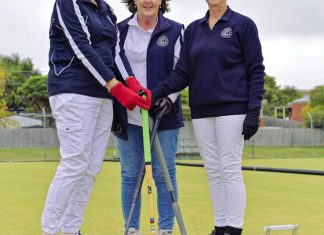SO YOU ALWAYS knew housework was boring you half to death?
Well, now it’s official, according to no less than two university studies by Deakin.
“Running, swimming and gym workouts all help people stay fit and mentally healthy and people who undertake these types of exercise are less likely to suffer depression,” Alfred Deakin Professor Kylie Ball said.
“But housework does not engender the same mental health benefits and shows no protective effects against symptoms of depression.”
Prof Ball, as well Dr Megan Teychenne, both from Deakin’s Centre for Physical Activity and Nutrition Research (C-PAN), revealed that dusting, vacuuming and scrubbing the bath generate exertion and physical health benefits yet the monotony of the menial work brings no mental health rewards.
The pair surveyed thousands of Victorian women about the amount and type of physical activity they undertook.
The studies aimed to identify associations between physical activity and the odds of depressive symptoms in women.
“To our knowledge, no previous research had compared leisure time, domestic and transport-related (walking and cycling) physical activity with odds of depressive symptoms in the same study,” Prof Ball said.
“Little research has been put in to what type of physical activity is most beneficial to good mental health and little is known about the optimal domain, dose and social context of physical activity for reducing the risk of depression.”
The first study, funded by the National Heart Foundation of Australia, surveyed 1554 women aged 18 to 65 from 45 Melbourne suburbs and all walks of life.
The second, funded by the National Health and Medical Research Council, surveyed 3645 women living in 80 socio-economically disadvantaged Victorian neighbourhoods in urban and rural areas.
“People living in disadvantaged neighbourhoods are less likely to be regularly physically active than those from wealthier neighbourhoods, which is why these areas were targeted in this study.”
The studies both found that women who reported walking or moderate intensity physical activity in leisure time were less likely to experience depressive symptoms.
But a surprise result also revealed that physical activity doing domestic chores contradicted the mental health benefits associated with exercise.
Prof Ball said the key finding of her research indicated the type of physical activity women get may be more important than the amount of exercise, when it comes to mental health.
Past findings have indicated that higher levels of physical activity were associated with lower odds of depressive symptoms, but that even just 30 minutes a week was linked with improved mental health.
“Our studies confirm previous findings that showed women’s moods were generally better when they were getting a workout in their leisure time.”
Prof Ball said the study also revealed the importance of the social aspects of exercise.
“Being a member of a sporting or recreational club, having someone to walk with in the neighbourhood and being active with a family member are all associated with improved mental health,” she said.
“This finding supports the dose of physical activity recommended in the US, UK and Australian national physical activity guidelines of at least two-and-a-half hours a week or at least 30 minutes on most, if not all days of the week.”
While housework may not confer mental health benefits, it does provide physical health benefits and is a useful form of exercise for many people.
“So spring cleaning is still good for health,” she said.








